Capitalism is an economic system based on the private ownership of the means of production and their operation for profit. Central characteristics of capitalism include capital accumulation, competitive markets, a price system, private property and the recognition of property rights, voluntary exchange and wage labor. In a capitalist market economy, decision-making and investments are determined by every owner of wealth, property or production ability in capital and financial markets whereas prices and the distribution of goods and services are mainly determined by competition in goods and services markets.
In economics, a free market is a system in which the prices for goods and services are self-regulated by the open market and by consumers. In a free market, the laws and forces of supply and demand are free from any intervention by a government or other authority, and from all forms of economic privilege, monopolies and artificial scarcities. Proponents of the concept of free market contrast it with a regulated market in which a government intervenes in supply and demand through various methods such as tariffs used to restrict trade and to protect the local economy. In an idealized free-market economy, prices for goods and services are set freely by the forces of supply and demand and are allowed to reach their point of equilibrium without intervention by government policy.
A market economy is an economic system in which the decisions regarding investment, production and distribution are guided by the price signals created by the forces of supply and demand. The major characteristic of a market economy is the existence of factor markets that play a dominant role in the allocation of capital and the factors of production.
This aims to be a complete article list of economics topics:

Private property is a legal designation for the ownership of property by non-governmental legal entities. Private property is distinguishable from public property, which is owned by a state entity, and from collective or cooperative property, which is owned by a group of non-governmental entities. Certain political philosophies such as anarchism and socialism make a distinction between private and personal property while others blend the two together. Private property is a legal concept defined and enforced by a country's political system.
Development economics is a branch of economics which deals with economic aspects of the development process in low income countries. Its focus is not only on methods of promoting economic development, economic growth and structural change but also on improving the potential for the mass of the population, for example, through health, education and workplace conditions, whether through public or private channels.

An economic system, or economic order, is a system of production, resource allocation and distribution of goods and services within a society or a given geographic area. It includes the combination of the various institutions, agencies, entities, decision-making processes and patterns of consumption that comprise the economic structure of a given community.

World-systems theory is a multidisciplinary, macro-scale approach to world history and social change which emphasizes the world-system as the primary unit of social analysis.
A dual economy is the existence of two separate economic sectors within one country, divided by different levels of development, technology, and different patterns of demand. The concept was originally created by Julius Herman Boeke to describe the coexistence of modern and traditional economic sectors in a colonial economy.
An economy is an area of the production, distribution and trade, as well as consumption of goods and services by different agents. In general, it is defined 'as a social domain that emphasize the practices, discourses, and material expressions associated with the production, use, and management of resources'. A given economy is the result of a set of processes that involves its culture, values, education, technological evolution, history, social organization, political structure and legal systems, as well as its geography, natural resource endowment, and ecology, as main factors. These factors give context, content, and set the conditions and parameters in which an economy functions. In other words, the economic domain is a social domain of interrelated human practices and transactions that does not stand alone.
In the history of economic thought, a school of economic thought is a group of economic thinkers who share or shared a common perspective on the way economies work. While economists do not always fit into particular schools, particularly in modern times, classifying economists into schools of thought is common. Economic thought may be roughly divided into three phases: premodern, early modern and modern. Systematic economic theory has been developed mainly since the beginning of what is termed the modern era.
An economic ideology distinguishes itself from economic theory in being normative rather than just explanatory in its approach. Economic ideologies express perspectives on the way an economy should run and to what end, whereas the aim of economic theories is to create accurate explanatory models to describe how an economy currently functions. However, the two are closely interrelated, as underlying economic ideology influences the methodology and theory employed in analysis. The diverse ideology and methodology of the 74 Nobel laureates in economics speaks to such interrelation.

The following outline is provided as an overview of and topical guide to economics:
Spheres of exchange is a heuristic tool for analyzing trading restrictions within societies that are communally governed and where resources are communally available. Goods and services of specific types are relegated to distinct value categories, and moral sanctions are invoked to prevent exchange between spheres. It is a classic topic in economic anthropology.
Throughout modern history, a variety of perspectives on capitalism have evolved based on different schools of thought.
Technological dualism was proposed by Benjamin Higgins. He was the Ritchie Professor of Economics at the University of Melbourne in the late 1940s. His theory explains the causes of unemployment in the underdeveloped economies. Developing countries of today are often characterized by dualistic economies. One is the modern sector while the other is the traditional (informal) sector. Their relation has been explained by Higgins in his theory explained below.

Marxian economics, or the Marxian school of economics, is a heterodox school of political economic thought. Its foundations can be traced back to the critique of classical political economy in the research by Karl Marx and Friedrich Engels. Marxian economics comprises several different theories and includes multiple schools of thought, which are sometimes opposed to each other, and in many cases Marxian analysis is used to complement or supplement other economic approaches. Because one does not necessarily have to be politically Marxist to be economically Marxian, the two adjectives coexist in usage rather than being synonymous. They share a semantic field while also allowing connotative and denotative differences.
Socialist economics comprises the economic theories, practices and norms of hypothetical and existing socialist economic systems. A socialist economic system is characterized by social ownership and operation of the means of production that may take the form of autonomous cooperatives or direct public ownership wherein production is carried out directly for use rather than for profit. Socialist systems that utilize markets for allocating capital goods and factors of production among economic units are designated market socialism. When planning is utilized, the economic system is designated as a socialist planned economy. Non-market forms of socialism usually include a system of accounting based on calculation-in-kind to value resources and goods.
The World Socialist Movement (WSM) is an international organisation of socialist parties created in 1904 with the founding of the Socialist Party of Great Britain (SPGB).

Julius Herman Boeke was a Dutch economist and lawyer. He was a professor of Dutch Constitutional Law at Leiden University, where he lectured and published works on the subject of the economy of the Dutch East Indies.





